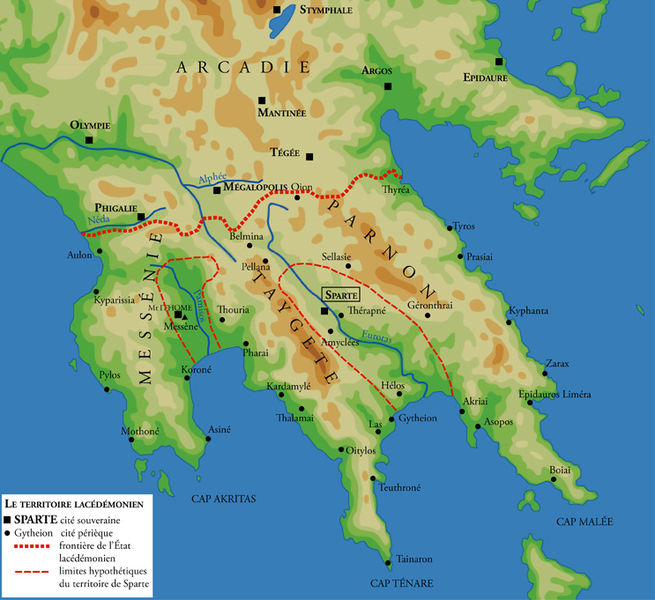
Main Difference
The main difference between Sparta and Athens is that the Sparta is a city-state in ancient Greece and Athens is a capital city of Greece.
-
Sparta
Sparta (Doric Greek: Σπάρτα, Spártā; Attic Greek: Σπάρτη, Spártē) was a prominent city-state in ancient Greece. In antiquity the city-state was known as Lacedaemon (Λακεδαίμων, Lakedaímōn), while the name Sparta referred to its main settlement on the banks of the Eurotas River in Laconia, in south-eastern Peloponnese. Around 650 BC, it rose to become the dominant military land-power in ancient Greece.
Given its military pre-eminence, Sparta was recognized as the leading force of the unified Greek military during the Greco-Persian Wars, in rivalry with the rising naval power of Athens. Sparta was the principal enemy of Athens during the Peloponnesian War (Between 431 and 404 BC), from which it emerged victorious. The defeat by Thebes in the Battle of Leuctra in 371 BC ended Sparta’s prominent role, though it maintained its political independence until the Roman conquest of Greece in 146 BC. It then underwent a long period of decline, especially in the Middle Ages, when many Spartans moved to Mystras. Modern Sparta is the capital of the Greek region of Laconia and a center for processing citrus and olives.
Sparta was unique in ancient Greece for its social system and constitution, which configured its entire society to maximize military proficiency at all costs, focusing all social institutions on military training and physical development. Its inhabitants were classified as Spartiates (Spartan citizens with full rights), mothakes (non-Spartan free men raised as Spartans), perioikoi (free residents engaged in commerce), and helots (state-owned serfs, enslaved non-Spartan local population). Spartiates underwent the rigorous agoge training and education regimen, and Spartan phalanx brigades were widely considered to be among the best in battle. Spartan women enjoyed considerably more rights and equality with men than elsewhere in classical antiquity.
Sparta was the subject of fascination in its own day, as well as in Western culture following the revival of classical learning. The admiration of Sparta is known as Laconism or Laconophilia. Bertrand Russell wrote:Sparta had a double effect on Greek thought: through the reality, and through the myth…. The reality enabled the Spartans to defeat Athens in war; the myth influenced Plato’s political theory, and that of countless subsequent writers…. [The] ideals that it favors had a great part in framing the doctrines of Rousseau, Nietzsche, and National Socialism.
-
Athens
Athens ( ATH-inz; Greek: Αθήνα, romanized: Athína [aˈθina] (listen); Ancient Greek: Ἀθῆναι, romanized: Athênai [atʰɛ̂ːnai̯]) is the capital and largest city of Greece. Athens dominates the Attica region and is one of the world’s oldest cities, with its recorded history spanning over 3,400 years and its earliest human presence started somewhere between the 11th and 7th millennium BC.Classical Athens was a powerful city-state that emerged in conjunction with the seagoing development of the port of Piraeus. A center for the arts, learning and philosophy, home of Plato’s Academy and Aristotle’s Lyceum, it is widely referred to as the cradle of Western civilization and the birthplace of democracy, largely because of its cultural and political impact on the European continent, and in particular the Romans. In modern times, Athens is a large cosmopolitan metropolis and central to economic, financial, industrial, maritime, political and cultural life in Greece.
Athens is a global city and one of the biggest economic centres in southeastern Europe. It has a large financial sector, and its port Piraeus is both the largest passenger port in Europe, and the second largest in the world. while at the same time being the sixth busiest passenger port in Europe.
The Municipality of Athens (also City of Athens), which actually constitutes a small administrative unit of the entire city, had a population of 664,046 (in 2011) within its official limits, and a land area of 38.96 km2 (15.04 sq mi). The urban area of Athens (Greater Athens and Greater Piraeus) extends beyond its administrative municipal city limits, with a population of 3,090,508 (in 2011) over an area of 412 km2 (159 sq mi). According to Eurostat in 2011, the functional urban area (FUA) of Athens was the 9th most populous FUA in the European Union (the 6th most populous capital city of the EU), with a population of 3.8 million people. Athens is also the southernmost capital on the European mainland.
The heritage of the classical era is still evident in the city, represented by ancient monuments and works of art, the most famous of all being the Parthenon, considered a key landmark of early Western civilization. The city also retains Roman and Byzantine monuments, as well as a smaller number of Ottoman monuments. Athens is home to two UNESCO World Heritage Sites, the Acropolis of Athens and the medieval Daphni Monastery. Landmarks of the modern era, dating back to the establishment of Athens as the capital of the independent Greek state in 1834, include the Hellenic Parliament and the so-called “architectural trilogy of Athens”, consisting of the National Library of Greece, the National and Kapodistrian University of Athens and the Academy of Athens. Athens is also home to several museums and cultural institutions, such as the National Archeological Museum, featuring the world’s largest collection of ancient Greek antiquities, the Acropolis Museum, the Museum of Cycladic Art, the Benaki Museum and the Byzantine and Christian Museum. Athens was the host city of the first modern-day Olympic Games in 1896, and 108 years later it welcomed home the 2004 Summer Olympics, making it one of only a handful of cities to have hosted the Olympics more than once.
